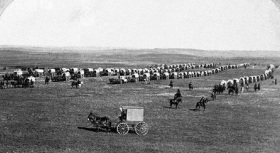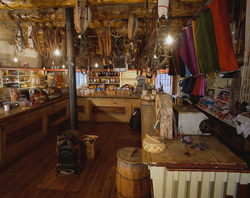Life Along the Trail

Life along the Oregon Trail was by no means easy. Before the journey, many preparations had to be made. After the journey along the trail began, everyone, even the children, had jobs to do everyday. Not everything along the trail had to be hard work, at times the trail was pleasant.
Preparations

The troubles would start even before the travelers would leave to take on their journey. They needed to get all there supplies before they had to leave, which was early spring. This undertaking would begin months before they would leave. They would need to build their own wagons. Preparations to take the journey to Oregon could be just as hard as the actual journey.
The list of supplies that the travelers took with them was an overwhelming amount. Some of the more important ones were 200 pounds of flour, 150 pounds of bacon, 10 pounds of coffee, 20 pounds of surgar, and 10 pounds of salt. Other supplies included beef, rice, tea, dried beans, dried fruit, baking soda, vinegar, pickles, tallow, whiskey, gunpowder, a kettle, a frying pan, a coffee pot, tin plates, cups, knives, forks, oxen, and spair wagon parts. Oxen, wagons, and gear sometimes cost more than $400, supplies could cost another $200, and powder and shot was another $75. Above all of that, travelers needed money for when they got to their destination to build a house and for the crops. Moving to Oregon Territory was a very expensive decision.
First, the travelers would need to build their own wagons. Most travelers would make their wagons out of seasoned hardwood. Some even tarred the sides of their wagons so they could be lifted of the wheelbase and float across the rivers. This would take months to do. Building wagons was one of the first preparations started, but a very long one.
The list of supplies that the travelers took with them was an overwhelming amount. Some of the more important ones were 200 pounds of flour, 150 pounds of bacon, 10 pounds of coffee, 20 pounds of surgar, and 10 pounds of salt. Other supplies included beef, rice, tea, dried beans, dried fruit, baking soda, vinegar, pickles, tallow, whiskey, gunpowder, a kettle, a frying pan, a coffee pot, tin plates, cups, knives, forks, oxen, and spair wagon parts. Oxen, wagons, and gear sometimes cost more than $400, supplies could cost another $200, and powder and shot was another $75. Above all of that, travelers needed money for when they got to their destination to build a house and for the crops. Moving to Oregon Territory was a very expensive decision.
First, the travelers would need to build their own wagons. Most travelers would make their wagons out of seasoned hardwood. Some even tarred the sides of their wagons so they could be lifted of the wheelbase and float across the rivers. This would take months to do. Building wagons was one of the first preparations started, but a very long one.
Roles of Men
Men would usually do all the muscle work. They need to know how to repair the wagon when they had no spair wood with them. Also, men needed to know how to drive four or five yoke of oxen, even when they are terrified while crossing rivers. Additionally, they need to know what grass the animals would want to eat and where the water was or was not poisonous. The men's everyday role was to deal with all the back-breaking labor of the Oregon Trail.
Roles of Women
Women were a very important part to be able to finish the journey safe. The life of women along the trail was mostly cooking and taking care of the small children and babies. They need to know how to make a fire in the wind and rain with only weeds and buffalo chips for fuel. Also, women needed a large amount of patience to deal with the complaints of babies and young children. Without women, finishing the journey along the Oregon Trail would be an enormous task.
Roles of Children
Children usually did all the extra, easy work. One common role of children would be to get the firewood. Also, when the travelers attempt to go through the Blue Mountains, the children would lay rocks down behind the wagon's wheels while the men would pull the wagon up. Children would usually do all the work men and women do not have time to do during the day.
